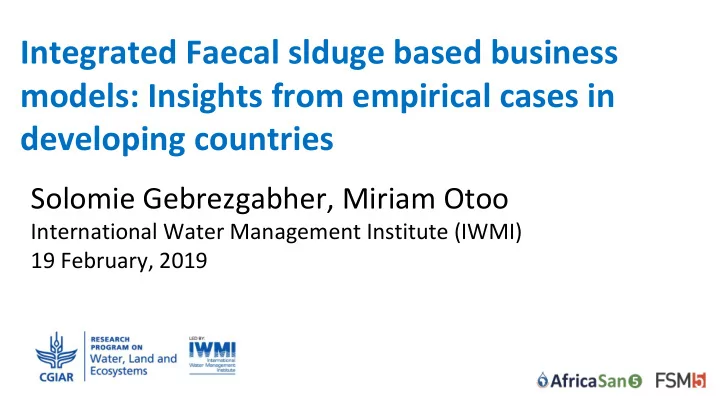

Integrated Faecal slduge based business models: Insights from empirical cases in developing countries Solomie Gebrezgabher, Miriam Otoo International Water Management Institute (IWMI) 19 February, 2019
IWMI research division on Resource Recovery & Reuse (RRR) • To increase the scale and viability of the productive reuse of water, nutrients, organic matter and energy from domestic and agro-industrial waste streams through the analysis, promotion and implementation of economically viable business models Technology // Business models // Policy and Institutions // Capacity building
FSM from onsite sanitation systems (OSS) • OSSs are key component of sanitation services • Management of FS from OSSs remains one of the most neglected challenges • Need for FSM beyond the provision of toilets, emphasizing safely managed sanitation services
Effective FSM requires • Strong local capacities across the whole sanitation service chain • Effective regulations and supportive policies • Institutional linkages across private and public sectors supported by viable business models
The potential of RRR FS from OSSs has the potential for safe resource recovery • Paradigm shift from waste that needs disposal towards • creating valuable resource In low income countries a range of options exist that support • the use of treated sludge for productive purposes
FSM business cases
Public toilet with energy recovery model Cases from Kenya and India Initiated by private entity or CBO • Requires partnership with municipality for access to • land for toilet complex Multiple value proposition • Key to success: • – Low-cost technology – Community-led strategy – Support from and partnership with local government
Residential-institutional biogas model Cases from Rwanda, Nepal, Philippines Implemented in institutions with large number of • residents Saving in energy costs in institutions • Reduced cost for emptying and transportation of sludge • Key to success: • – Partnership with local expertise and institutions – Government support for renewable energy – Ban of the use of firewood in institutions (e.g. prisons)
Farmer-truck Operator Partnership Model Cases from Ghana and India • Partnership (informal) between private truck operators and farmers • Low-cost manure to farmers saving costs on fertilizer while paying fee to truck driver • Changing the common system where the driver pays for disposal • On-farm treatment of FS by natural solar treatment • Potential safety and health issues (on-farm safety measures)
FS-based fertilizer for revenue generation model Cases from Ghana and Sri Lanka PPP model • Produce a safe and valuable product for agricultural • production through co-composting Requires linkages between those in charge of MSW • collection and those serving OSSs Value addition through blending and pelletization •
Conclusion and way forward ● OSSs offer easier and safer entry point for energy, nutrient and organic matter recovery ● Resource recovery plays an important role in addressing multiple challenges within and beyond the waste and sanitation sectors ● FSM options should consider value propositions beyond access to toilets and thus more business thinking is required ● Need for capacity development and strong incentive systems for inter-sectoral collaboration
The case studies were selected from these publications Thank you Solomie Gebrezgabher s.gebrezgabher@cgiar.org
http://www.iwmi.cgiar.org/publications/resource-recovery-reuse/
Recommend
More recommend